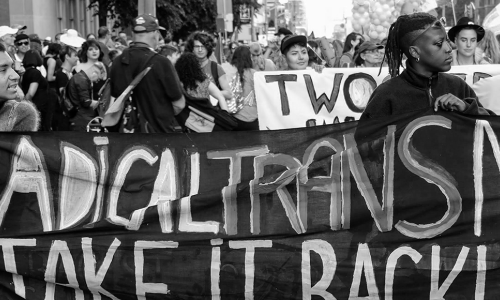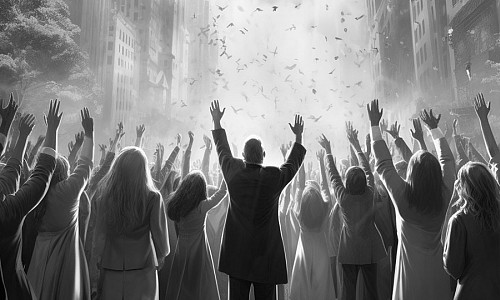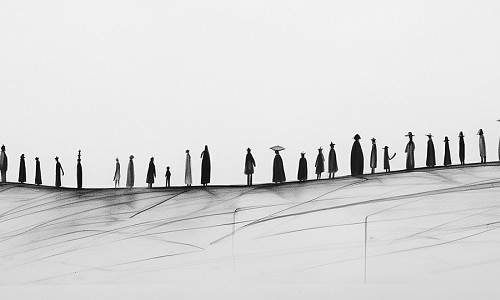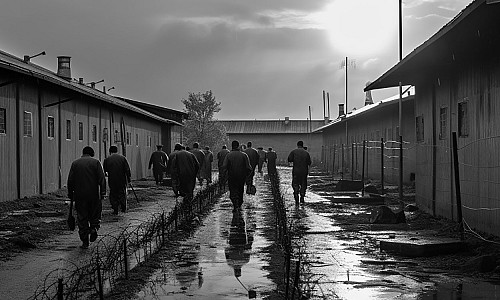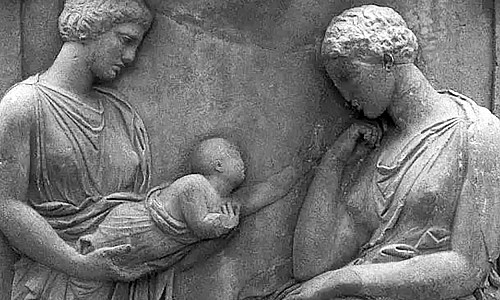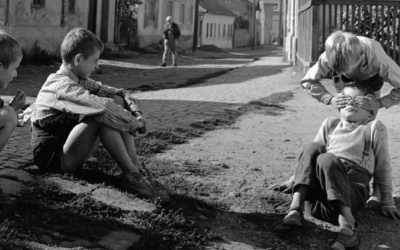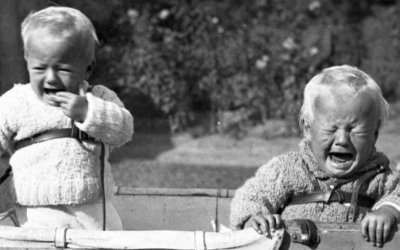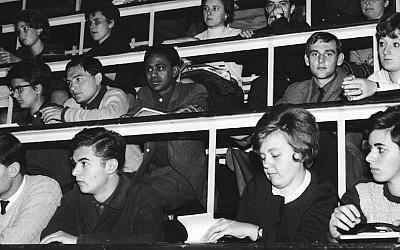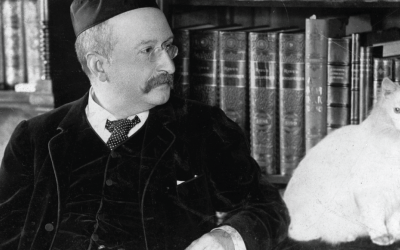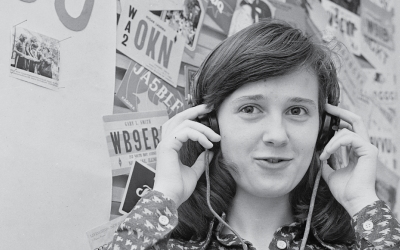Sturla Haugsgjerd urges drug policy reform in an open letter to Norway’s Prime Minister.
When I early one morning last summer rowed out to Stangenesholmen, and spotted that old, white-painted fisherman’s shack for the first time it left a monochrome image on my retinas—it looked just like in the old photographs. Against the wall, in the peeling sun, sat three figures with their arms flying. As I approached them the theme of their discussion became abundantly clear: that every person has equal worth!
Jonas Gahr Støre, this scene is no coincidence. It was very much my intention that day to seek out this very islet, and these three figures in particular, for they are all our mutual friends. Stangenesholmen goes by a different name in our circles: ‘Trotsky-holmen’, and these people whose voices I sought were none other than Leon Trotsky, Nic Waal, and Arnulf Øverland.
They had most likely chuffed out to Trotsky-holmen in Arnulf’s boat “Grønningen,” as they had done all through those hot 1930s summers—provided, of course, that Trotsky, who lived under a fake name at the time, hadn’t caught tails from Quisling’s waffenträger. Oftentimes they each brought friends and trusted comrades, among them Karl Evang, Sigurd Hoel and, at one time perhaps, Wilhelm Reich.
They all held one ambition in common: to create a new and thriving society—to repudiate the spectre of fascism, which haunted all the world during those years. I think you know where this is going, Jonas. These are my heroes, but they are yours too. All of us... them, I, and you with us... share in that same struggle to grant all peoples of the world the right to decency. Our heroes fought tooth and nail for a society based on the tenets of humanism, reason, empathy and enlightenment; to forsake populism, irrational suspicion, and fear.
Trotsky, in exile from Stalin’s Soviet Union, sought political asylum in southern Norway on Stangenesholmen for a brief time in August 1936. Stalin had his Pravda, Trotsky had Sørlandsavisen. Trotsky’s clandestine presence at the islet, especially in the context of growing National Socialist sentiment in the Norwegian Parliament—spearheaded by the National Gathering Party, and their party chair, and eventual Nazi collaborator Vidkun Quisling—inspired and brought together a critical group of political leftists, artists, and academics. Many of those present at Trotsky-holmen during that time would become key figures in post-war Norwegian spiritual life, culture, science, and politics. Among them: Nic Waal, leading first wave feminist figure—Norway’s first lady of psychoanalysis and paediatric psychiatrist; Arnulf Øverland, famous prisoner of war duing WW2, national poet and artist; Karl Evang, communist, physician, civil servant, and co-founder of the World Health Organization; Sigurd Hoel, prolific writer, critic, and cultural radical; and Wilhelm Reich, Austrian physician, psychoanalyst, and, at one time, student of Sigmund Freud.
Moral life
Humans are born free, but are everywhere in chains.
This is the epigraph with which Jean-Jacques Rousseau, the grandhero to us all, opens his manifesto. Everywhere there are chains, and only in the struggle to banish those chains have we achieved unimaginable good: universal suffrage, the right to bodily autonomy, abortion rights, and free healthcare—in a phrase, equal rights for all people. Therefore, I wonder why, after 250 years of Rousseau and 100 of Øverland, we still haven’t extended these plainly humanist principles to people struggling with addiction, whom our society still largely abandons.
I think you and I agree, Jonas, that these core values must be shared by all our healthcare institutions, and professionals. So I ask you again, why are these core values of our society not extended to those of us struggling with drug addiction—a patient group constituted by tens of thousands of our fellow citizens—ordinary people, like me?
In writing you this letter, I will seek to understand why I, and all those who struggle with illegal substances, feel so abandoned by our ostensibly enlightened and humanist society. In order to achieve such an understanding, I’m afraid I must take you into unknown territory. The truth is, there are people out there, not too unlike yourself, and your Labour Party fellows, who at this very moment are doing radical work to bring to fruition that society which all of us, you and I both, Jonas, have spent our lives envisioning.
I believe the key to unravelling the disparity between our stated, supposed values, and the State’s treatment of addicted persons can be found in the crucial testimony of those afflicted; those who still fall victim to state negligence in the second decade of the 21st century.
As they used to say on the Sopranos, I will now have to introduce you to two new friends of ours. Jonas, say hi to Gregg Caruso (U.S.), and Neil Levy (AU). These moral philosophers have spent their careers answering two of history’s most potent questions: do humans have free will? If not, what kind of society follows from such a conclusion?
Does free will exist?
Caruso, and Levy represent an increasingly influential school of thought, with which I, and hopefully soon you too, Jonas, will identify—the jargonic term is “optimistic free will scepticism.” I realise this is a squeaky term, but with a little more context I’m confident you will find it convincing.
As a philosophical dilemma the free will-question dates back to before Moses wore short pants, but remarkably we’re still just as perplexed as we ever were. Even giants like Kant and Schopenhauer could not entirely clear this monumental hurdle. Kant proclaimed: "A free will and a will under moral laws is one and the same," whereupon Schopenhauer replied “A man can surely do what he wills to do, but cannot determine what he wills. You are free to do what you want, but you are not free to want what you want.”
Despite Kant’s ubiquity in modern philosophy, there was a time when the ideological founders of post-enlightened European parliamentarism might have built their institutions upon the ideas of other philosophers. Kant’s writings on morality and free will, nevertheless, helped mobilise an entirely new popular consciousness that would topple feudalism, and reimagine society entirely. Kant’s ideas surely echoed frequently in the founding halls of Norway’s legal and moral laws; ingrained in public health, in our halls of justice—everywhere there are promises of the benevolent hand of government, and the continued abolishment of government as abuser.
Einstein’s insight
One morning in 1929,The Saturday Evening Post treated their subscribers to an interview with Albert Einstein, in which perhaps the greatest mind in the history of the world, renounced the honour of having conceived of his theory of relativity—a curious move... spit takes all around, to be sure. Einstein’s words echoed those of Schopenhauer:
I do not believe in free will. Schopenhauer's words 'man can do what he wants, but he cannot will what he wills,' accompany me in all situations throughout my life, and reconcile me with the actions of others, even if they are rather painful to me. This awareness of the lack of free will keeps me from taking myself and my fellow men too seriously as acting and deciding individuals, and from losing my temper.
Einstein did not hold prestige and accolades in high esteem, but perhaps more importantly nor did he believe in crime and punishment. “I know that philosophically a murderer is not responsible for [their] crime,” he said on another occasion, “but I prefer not to take tea with [them].”
Those professedly humanist social architects of the Enlightenment tradition nevertheless chose to turn a blind eye to Schopenhauer’s wisdom for 250 years, and have instead preferred to fill their cups with Immanuel Kant. The Köningsburger struck a primordial chord with his commonsensical categorical imperative, which he likely derived from long-established religious axioms. Kant’s assertion that one should “act only according to that maxim whereby you can, at the same time, will that it should become a universal law,” became a guiding star to the architects of the rule of law. Kant’s influence helped shape our principles of equality in the eyes of the law, freedom of thought and expression, and helped dilute those monopolies of power and violence that characterised feudal monarchical society. However, behind Kant’s innocuous truisms a more sinister implication lurks—Kant’s infamous thought experiment.
Kant’s desert island
"I am human, I think nothing human alien to me”—Tarentius
Imagine a deserted island, whereupon a society of people arises. However, one day all its residents decide to disband their village, dissolve into all four corners of the world, never to return, or regret. Only one resident remains, a murderer. The island will remain untouched by anyone else for all time. What then of the murderer? Kant says “whoever has committed murder must die” Our retribution is just, because—and this is imperative—simply, because it’s warranted. The criminal deserves it. Even with the promise that this person will neither harm another human, nor seek resocialisation with any society; even in the absence of a legal, or moral precedent, Kant nevertheless insists upon the criminal’s death. Thus the concept of “just desert” appeared, meaning not at all an arid land, but deriving from the much older French word for what one deserves (de(s)servir). Just desert, is simply a cruel play on that which one deserves.
Kantian Just-world theory, with its inherent “Deserved punishment, moral responsibility” is the central pillar of our judicial lives. Simply put: those who break the law must be punished because, and only because, by breaking said law, they have acted immorally. Long-term considerations; the consequences of a legal record of precedents, the power of social and political norms, respect to the ebbs and flows of judicial norms, only entered the discourse later. These later essential discoveries remain, however, relegated to the moral rationale of the central pillar: that those who act immorally deserve punishment.
Hard luck, bad luck
Here come the moral philosophers leading our age: Greg Caruso, and Neil Levy both challenge Kant’s moral imperative, and approach the question of free will, and “deserved punishment,” with a combination of theory and praxis. The discovery of quantum physics threatened to condemn determinism to the ash heap of history, complicating the debate further. Tenets of cause and effect lost their absolute status, and our framework of the pre-determined as a result of causality faced serious scrutiny.
We have Neil Levy to thank for the term “Hard Luck.” In Levy’s approach, he remains open to the possibility that perhaps not all things are predetermined by causality. So what, Levy says. Fortune, and misfortune, which Levy operationalises as constitutive luck, and present luck, suggest that free will, regardless of all efforts, remains impossible. Let me explain: none among us, not you, nor I, chose our birthplace, nor did we choose our parents; we choose no more the civil wars that force our exile than we choose the sexual abuse we suffer—constitutive hard luck. Conversely, you choose no more, or less, to get run over by a tram Wednesday morning than you choose for a comet to strike the Atlantic, and the consequent new ice age, or for the stock market to crash on the same day as you invested big—present bad luck.
Now, let’s deconstruct the phrase optimistic free will scepticism. Those who swear by its application are highly sceptical of the existence of free will. Even in the face of a world undetermined, they hold fast that free will remains elusive due to the nature of Levy’s aforementioned hard luck.
What, then, of optimism? We are about to descend from cruising altitude here... get our feet back on the ground. We’ll be approaching the runway of tangible policy built on applied philosophy. This is your captain, Gregg Caruso speaking.
Public health, and freedom
The American-born professor of philosophy’s current works Rejecting Retributivism, and Just Desert (a collaboration with Daniel Dennett) concern how to extract real material and social benefit from the free-will debate; (to which degree) can we achieve tangible benefits from such a discourse? Here Caruso compels us to imagine a society in which the illusion of free will has been shattered beyond repair. What does a world in which the illusion of free will is shattered look like? Where his critics imagine dystopias from such a state of affairs, Caruso instead imagines fertile ground. According to Caruso, it is possible to live in a world where one’s will is not free, but in which people are increasingly free. Caruso has reanimated the free-will debate by rattling Rousseau’s chains, and you’re reading this right: Caruso recommends abolishing the concept of punishment altogether. In punishment’s place, Caruso proposes what he calls the Public Health Quarantine Model.
We’re once again invited to imagine: two passengers on a plane from Africa to Europe. One is a psychotic axe-murderer, who against all odds managed to evade police, and flee the country. The other passenger is a doctor inadvertently infected with the ebola-virus, after working in a local village in the country of departure. During the flight, they are both found out. A fellow passenger identifies the axe-murderer, while the doctor diagnoses themselves when their symptoms turn undeniable. The control tower at their destination is informed, and they in turn involve the authorities. As things are, the axe-murderer is apprehended by armed police, and the ebola-infected doctor is handled by medical personnel. Both carry a deadly contagion. The devil is in the fact that the physically ill passenger cannot be blamed for their affliction. The murderer, however, has, with deliberate intent, broken Kant’s imperative, the laws and conventions of the judicial state, and society’s good morals. One must be punished, the other merely receives a quarantine order.
If you’re paying attention, this premise squeaks more than it does at first glance. The murderer, according to Caruso, is no more free to choose their threat to society than the infected passenger. Thus, the murderer should also be granted the clemency of quarantine, followed by the necessary conciliatory and therapeutic steps to reintegrate them into society. Seen through Caruso’s American lens, this conclusion must strike his fellow countrymen as positively dystopic. The US, after all, is where each person is the farrier of their own fortune, and where the view of punishment is epitomised in the words of Ronald Reagan: “We must reject the idea that society is guilty, rather than the lawbreaker.” To refute this essentially American worldview Caruso points to none other than Norway. In fact we’re going there now: via plane from Africa!
Norway is different
Jonas, I’d like you to meet a friend of mine, “Johanne,” a dedicated nurse, and mother of two living in Oslo. Throughout the 1990s and 2000s, however, she lived in a home marred by addiction and crime. She has been fined, imprisoned, and was generally viewed as an immoral criminal by both her friends and family, and society at large.
Our story doesn’t start in Oslo, though, as it happens, but in Ethiopia in the 1970s. It was misfortune that birthed Johanne to a family, which the governing Derg-regime, and their brutal leader Mengistu, viewed as enemies of the state. Throughout the conflict—one of the more brutal civil wars of the modern era—a very young Johanne sought shelter with her family from the persecution of Derg-forces.
The road to Norway via a refugee centre in Sudan was long and arduous. She was both a victim of, and witness to violent assaults—neither of which she herself chose. She is a survivor of sexual assault; she’s been forced to witness the maiming and torture of her family, and the deaths of many more in bloody battles. Talking to her, nearly 50 years later, she recalls the worst parts of her experiences were the sounds of it all. The bloody details are naturally too much for her to depict.
Johanne’s stint with Norwegian foster homes in the 1980s and 1990s was turbulent, and very few could even imagine her trauma, or knew how to help her. Her moods could be explosive—she was clearly very troubled, at times violent, and used all the Norwegian profanity she knew. More than once she turned a burden to her well-intentioned, but ultimately ignorant, Norwegian foster parents.
Her foster parents, along with Norwegian public health authorities, decided to send her to her Ethiopian uncle, who lived in Oslo at the time. Her uncle was, unfortunately, also a victim of the Derg-regime, having survived ferocious torture over multiple years in a dark dungeon in the borderlands between Ethiopia and Eritrea. He had taken to alcohol to dull both his physical and psychological pains. Before long, his drinking billed violent tendencies, which Johanne paid dearly for. The rest of it is plainly history, and the only plot twist, so to speak, is the fact that Johanne did in fact escape the cycle of crime and violence.
I could recount the stories of dozens, if not hundreds, of people who struggle with trauma, and substance abuse, whose acquaintance I’ve made during my many institutional stints. People of every stripe, colour, gender, sexuality, and ability; from Vietnamese refugees who recounted their abuse in Thai refugee camps, to upper middle-class girls from Oslo’s westside with eating disorders and stories of sexual abuse. I’ve met Arab women who were gang-raped by police. I know Norwegian Yugoslavs who survived the Balkan war with memories of missing, tortured, and murdered family members. Each story is unique, yet they all share one thing in common: an undeniable connection between childhood trauma and substance abuse.
Dr. Vincent Felitti from Kaiser Permanente performed the first meta-study of its kind, on the effect of adverse childhood experiences (ACE). Over 17.000 participants filled out his detailed forms, which cross-referenced adult at-risk behaviour (obesity, drugs, sex-obsession etc.) with traumatic experiences. In time the experiment revealed a clear and dramatic correlation. If we are to believe Felitti, if one suffers from post-traumatic stress, the chances of heavy dependency on illegal substances increases as much as 5000%. ACE examines a wide range of traumas, from violence, sexual, and psychological abuse, use of illegal drugs, parental disability, alcoholism, familial mental illness, incarceration, institutionalisation, divorce, neglect etc. In addition to increased likelihood of illegal substance use, it’s been proven that children with high ACE-scores are likely to face a wide range of challenges as adults.
A few numbers: with an ACE-score of over 4 (meaning a score of four, or more, from the above-mentioned challenges) a child is three times as likely to suffer from lung disease due to cigarette-smoking, twice as likely to suffer liver failure, five times more likely to develop severe depression, fourteen times more likely to attempt suicide; last but not least, fifty whole times more likely to develop a severe dependency on a scheduled substance. Johanne’s story, and those of women out there like her, must be viewed in light of these findings. The odds that any of us will leave Life’s Casino with any mentionable winnings, are, to put it mildly, low. Ca. 5000% lower when one suffers from complex PTSD.
So what’s the key to Johanne’s unlikely success? The Norwegian judicial system, and our judicial norms. Some key figures: the US imprisons 700 out of every 100,000 people, while Norway imprisons around 60 out of every 100,000. Life sentences in the US are roughly 50 out of every 100,000 people, which is the figure for Denmark, Finland, and Sweden combined. Norway cannot be included in this tally, as we theoretically don’t operate with life sentences. Most importantly perhaps, are rates of recidivism. In the US 68% of ex-convicts are reimprisoned only three short years after parole. Six years after parole, 79% are reimprisoned, and after nine years this figure rises to 83%. Norwegian rates of recidivism, however, stick at roughly 20%, the lowest in the world. If we’re to believe Gregg Caruso, we can ascertain this discrepancy between Norway, and the US, results from differences in approaches to moral absolutes.
Part of Norway’s international prestige is that we value rehabilitation and reintegration over punishment of moral infractions. Convicts are encouraged to develop interpersonal relations with their co-convicts and their guards, and they are trained to exercise “maximum autonomy” while institutionalised. There’s a lot of testimony out there, from Bastøy to Halden: the notion that everyone deserves a second chance underpins the ethos of the Norwegian prison service. This is a stark contrast to the US, or even Great Britain, where punishment is construed in the most Kantian sense possible: the criminal must be punished because, and only because, they have broken the law. Seems we’re well on our way, Jonas! Even foreign philosophers think we’re an international top scorer in the realm of justice.
Humanist world champion?
Behind every crime, and behind every moral infringement; behind every Nobel prize, and gold medal there’s a line of causality, and a history—the history of parents, birthplace, socioeconomic circumstances, violence, war, that one teacher who actually saw us, inspired serendipity, coincidental connection, and last, but not least, money. The rich become richer, and vice versa.
What all my anecdotes thus far have shared in common is but one conclusion: that which has shaped our character, and our “will,” for good, or ill, is never the result of choice. There is no plausible theory with which we could manipulate the inner workings of fate, or to paraphrase Nietzsche, the desire to carry, upon our own shoulders, the ultimate responsibility for our actions—to acquit our God, as well as our ancestors; cruel coincidence, all the world and our societies—dooms us to perpetually pull ourselves out of the swamplands of nothingness by fistfuls of our own hair.
It is exactly this Sisyphean demand that we addicted persons feel is unduly placed at our feet. The continuing failure of Norwegian drug reform is a message to us all, that our so-called choices must necessarily doom us to pull ourselves out of our desolate swamps by nothing but our hair. In light of our progress, Jonas, our status as an international champion of not only skiing and 110-metre hurdles, but of prison-rates and recidivism-rates, our approach to drug reform is patently absurd. I confidently yell, Jonas: humanist world champion! It makes no sense that my story, and Johanne’s story, gets treated as though we ourselves could have written the manuscript of our lives, premeditating every intrigue and wayward path. The stories of our lives only materialise in post, in the editing room. None of us must ever be punished for what we do to our own bodies. Prison, fines, social exclusion do nothing for anyone, but the most viciously punitive. We, none of us, chose our parents, our birthplace—but to use needles in our own veins is, in your eyes, an active choice, which must, and should be punished.
Drug reform now
We’ve made it this far. Both of us already belong to the humanist tradition to which I credit Nic Waal, Arnulf Øverland, Karl Evang et al. On the beckoning of Caruso we continue construction on the railways of philosophica humaniora that Schopenhauer, Einstein, and Nietzsche initiated.
The above confessions demand political action, and only one kind of action will suffice: to move away from punishment of addicted persons, and toward clemency, therapeutic assistance, and medical treatment. At road’s end, should you not choose to actively pursue the most consequential social reform our country’s ever seen, I hope your God, your ancestors, the forces of coincidence, the universe, and our wider society continue with all their power to lead you there. Good luck, Mr. Prime Minister! You’ll need it.
Sturla Haugsgjerd is a Norwegian journalist and activist. His addiction to opiates, benzo and alcohol has informed every aspect of his professional, moral, and spiritual life over the past 15 years.
You might also like...





